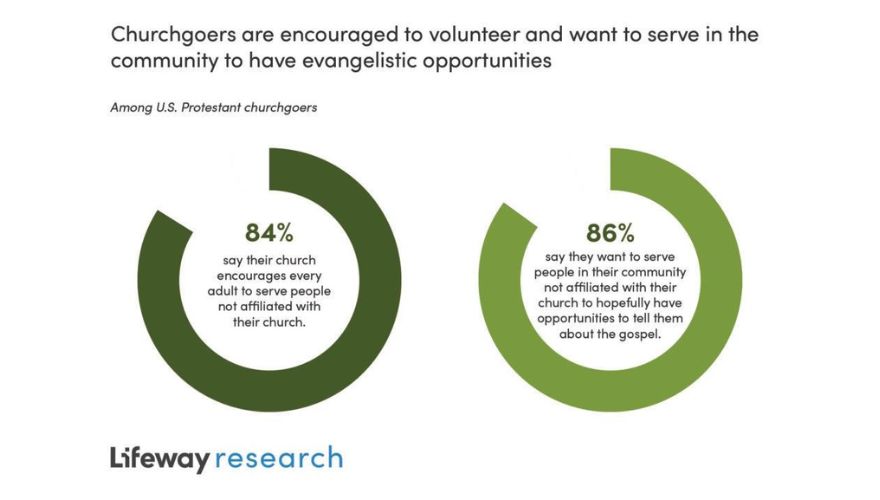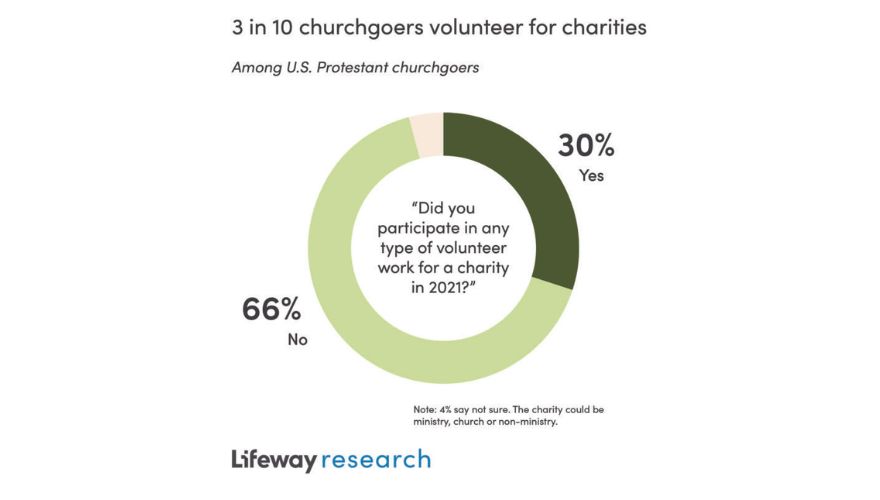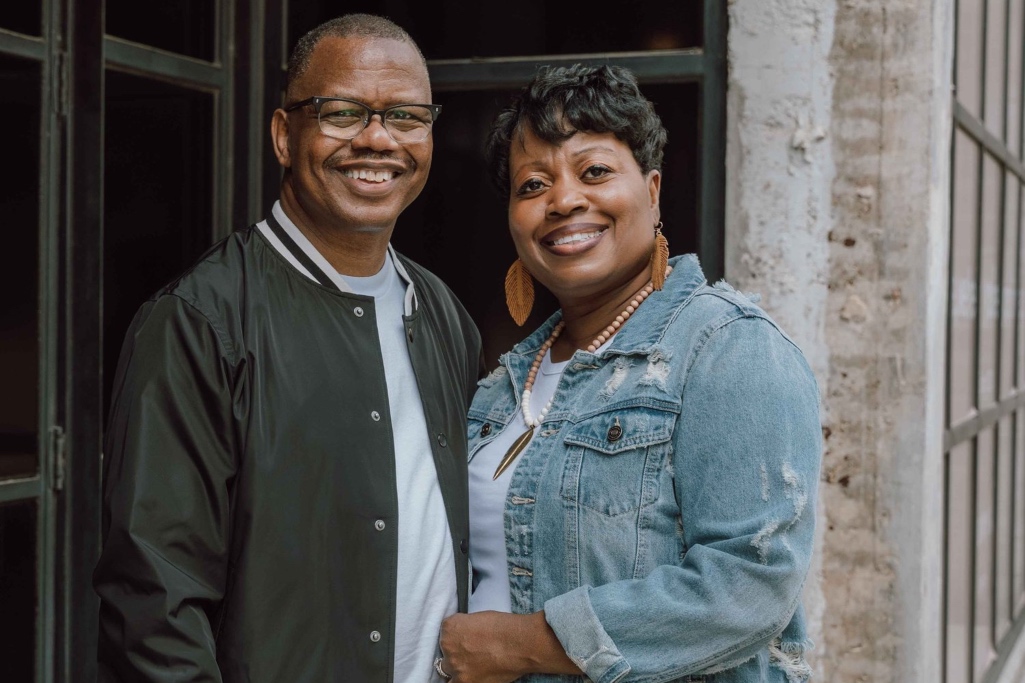
BRENTWOOD, Tenn. (BP) – Although most churchgoers want to serve in their communities for gospel impact, there is a noticeable gap when it comes to the number who are already volunteering for a charity.
Most Protestant churchgoers say their churches encourage them to serve people not affiliated with their church and that they want to do so. But few have volunteered in the past year. More than 4 in 5 churchgoers say their churches encourage every adult to serve people outside their church (84 percent) and they want to serve these people in hopes of sharing the gospel (86 percent).
Despite saying they want to serve people who are not a part of their church, few churchgoers are even serving within the context of their own churches. Two in 3 (66 percent) churchgoers say they have not volunteered for a charity (ministry, church or non-ministry) in the previous year. Three in 10 (30 percent) say they have, and 4 percent are not sure. According to the latest findings of the U.S. Census Bureau, 23 percent of Americans volunteered through an organization between September 2020 and September 2021.
“The easiest way to serve others is when a charity or group organizes the effort,” said Scott McConnell, executive director of Lifeway Research. “They recognize the need, come up with a plan and often gather needed resources. You just have to show up. Churchgoers say they want to, but less than a third showed up to help a charity in the previous year.”
In another 2022 Lifeway Research study, Protestant pastors said churchgoers were more likely to serve in the church than in the community. Pastors estimated, on average, 42 percent of their adult churchgoers were involved with regular responsibilities at their churches. And pastors estimated an average of 27 percent of adult churchgoers were involved in serving in the community.
The gap between desire and action
Although younger churchgoers – 18-34 (91 percent) and 35-49 (91 percent) – are more likely than those 50-64 (84 percent) and older than 65 (79 percent) to say they want to serve people in their community who are not affiliated with their church, the oldest churchgoers (those over the age of 65) are the most likely to say they participated in any type of volunteer work in the previous year (40 percent).
Denominationally, Methodists are the most likely to say their churches encourage them to be involved in ministry that serves community members not affiliated with the church (98 percent) and among the most likely to say they want to do this in hopes of sharing the gospel (95 percent). Still, Methodist churchgoers are the most likely to say they did not participate in any volunteer work in the previous year (88 percent).
“This study did not measure service churchgoers may have done individually for their neighbors. Meeting such needs as they arise is a great form of service,” McConnell said. “But some of the most widespread needs in communities require volunteers working together, something that the majority of churchgoers don’t do over the course of a year.”
A similar gap between desire and action exists for Christians sharing their faith, according to a 2022 Evangelism Explosion study conducted by Lifeway Research. More than 9 in 10 (93 percent) self-identified Christian adults in the U.S. say they are at least somewhat open to having a conversation about faith with a friend. And around 4 in 5 (81 percent) feel similarly about speaking about faith with a stranger. Yet, in the past six months, 53 percent had a conversation about faith with a loved one. And 40 percent had a conversation about faith with a stranger.
Although many factors may contribute to this gap, pastors identified one in a 2021 Lifeway Research study that may play a role in churchgoers’ hesitation to get involved in both evangelism and community service – comfort. More than 2 in 3 Protestant pastors (67 percent) say comfort is a modern-day idol that has significant influence in U.S. churches.

Cultivating desire that leads to action
Theological beliefs and church attendance frequency contribute to the likelihood a person wants to serve and will have actually volunteered outside of their congregation. Those who attend a worship service at least four times a month are more likely than those who attend one to three times a month to want to serve people in their communities (88 percent v. 82 percent). The most frequent church attendees are also the most likely to have volunteered in the past year (37 percent).
Additionally, those with evangelical beliefs are more likely than those without to have a desire to serve those in their communities who are unaffiliated with their churches (90 percent v. 83 percent) and to have served to in the past year (37 percent v. 25 percent).
“Service is contagious. When you are regularly participating in the life of your church, people you get to know will ask you to serve with them,” McConnell said. “Doing good things with friends is enjoyable and easier to find time to do.”
For more information view the complete report and visit LifewayResearch.com.
Methodology
Lifeway Research conducted the online survey of 1,002 American Protestant churchgoers Sept. 19-29, 2022, using a national pre-recruited panel. Respondents were screened to include those who identified as Protestant/non-denominational and attend religious services at least once a month. Quotas and slight weights were used to balance gender, age, region, ethnicity, education and religion to more accurately reflect the population. The completed sample is 1,002 surveys. The sample provides 95 percent confidence that the sampling error does not exceed plus or minus 3.3 percent. This margin of error accounts for the effect of weighting. Margins of error are higher in sub-groups.
“Evangelical beliefs”are defined using the National Association of Evangelicals and Lifeway Research evangelical beliefs research definition based on respondent beliefs. Respondents are asked their level of agreement with four separate statements using a four-point, forced-choice scale (strongly agree, somewhat agree, somewhat disagree, strongly disagree). Those who strongly agree with all four statements are categorized as having Evangelical Beliefs.
- The Bible is the highest authority for what I believe.
- It is very important for me personally to encourage non-Christians to trust Jesus Christ as their Savior.
- Jesus Christ’s death on the cross is the only sacrifice that could remove the penalty of my sin.
- Only those who trust in Jesus Christ alone as their Savior receive God’s free gift of eternal salvation.
(EDITOR’S NOTE – Marissa Postell Sullivan is a writer for Lifeway Christian Resources.)


